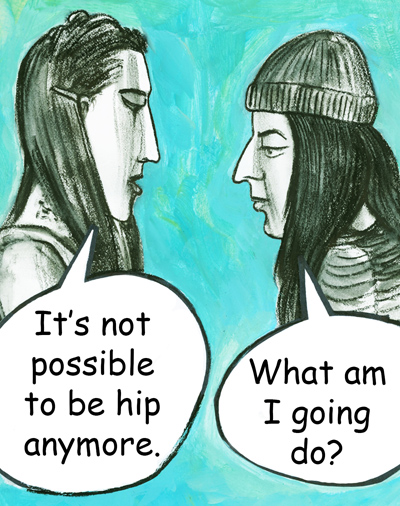 Every Saturday, we’ll be posting a new illustration by David Lester. The Mecca Normal guitarist is visually documenting people, places and events from his band’s 29-year run, with text by vocalist Jean Smith.
Every Saturday, we’ll be posting a new illustration by David Lester. The Mecca Normal guitarist is visually documenting people, places and events from his band’s 29-year run, with text by vocalist Jean Smith.
2002 was the year we began our classroom and gallery event called How Art And Music Can Change The World, which, in 2004 morphed into a touring art exhibit called The Inspired Agitators And The Pantomime Horse after which we decided to use How Art And Music Can Change The World as the broader title under which specific lectures were created, including an adaptation of David Lester’s 2011 graphic novel The Listener. Our presentations always include David’s Inspired Agitator poster series—one of which will be included in the 2014 Whitney Biennial.
Back to 2002, when Mecca Normal was on tour to support an album called The Family Swan (Kill Rock Stars, 2002), most of our shows included art, whether that meant hanging it for the night in rock clubs and all-ages venues or, in the case of the Bottle Cap—upstairs at Chicago’s Empty Bottle—where we were thrilled to have a longer exhibit in a regular art space that included short, low volume Mecca Normal performances—requests from individuals. That is to say, someone could request a song, and more often than not, they were the only person in attendance while we played it.
While Mecca Normal has a vast amount of experience with very small audiences, playing for one person is unnerving for everyone—all three of us—especially the person who requested the song. There is a difference between the idea of a personal performance and the reality of being addressed by a singer insisting on eye contact while performing quite possibly the best live version of any given piece in her repertoire. It’s as though adversity fuels us, providing us with something to address and rise above. It is perhaps true that we are least comfortable in front of large audiences, sheltered as they are, row upon row, spectators forcing us toward the role of spectacle. No, I want that connection—lights up in the house—the people in front of us hearing what could be reduced to an audible force against injustice, the galvanized energy of voice and guitar that intends to introduce the unease of illumination. No, there’s nothing essentially cool (or hot) about Mecca Normal. We’re in our mid-50s for god’s sake. Political art and artists—bands with lyrics about political subjects—come and go and are rarely in fashion.
I recently polled my Facebook friends for names of political bands functioning in the USA and examples ranged from obscure to long ago. If you’re thinking about making it big (and who isn’t?), writing songs about contentious issues that can be alienating to mainstream audiences seems like something to avoid. Political content within a four-minute rock song seems to require an intensity of effort to shuck slogans and rhetoric—and then there’s the whole issue of being misunderstood or labeled “political” like I was in the 1980s with a song by my then boyfriend’s band Spirit Of The West. Some of it stung, but I have never taken the opportunity to divulge my side of the story, why “every little thing had to be so political”—which was a hit, of sorts, in Canada.
“Pocket Of Scribbly Gums,” from Janis Zeppelin (Smarten UP! 2003) (download):






